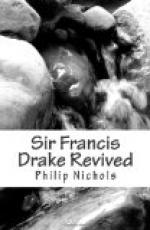Among the manifold examples hereof, which former Ages have committed to memory, or our Time yielded to sight: I suppose, there hath not been any more notable then this in hand; either in respect of the greatness of the person in whom the first injury was offered, or the meanness of him who righted himself. The one being, in his own conceit, the mightiest Monarch of all the world! The other, an English Captain, a mean subject of her Majesty’s! Who (besides the wrongs received at Rio de [la] Hacha with Captain John Lovell in the years 1565 and 1566) having been grievously endamaged at San Juan de Ulua in the Bay of Mexico, with captain John Hawkins, in the years 1567 and 1568, not only in the loss of his goods of some value, but also of his kinsmen and friends, and that by the falsehood of Don Martin Henriquez then the Viceroy of Mexico; and finding that no recompense could be recovered out of Spain, by any of his own means, or by Her Majesty’s letters; he used such helps as he might, by two several voyages into the West Indies (the first with two ships, the one called the Dragon, the other the Swan, in the year 1570: the other in the Swan alone in the year 1571, to gain such intelligences as might further him, to get some amends for his loss.
On Whitsunday Eve, being the 24th of May, in the year 1572, Captain Drake in the Pascha of Plymouth of 70 tons, his admiral [flag-ship]; with the Swan of the same port, of 25 tons, his vice-admiral, in which his brother John Drake was Captain (having in both of them, of men and boys seventy-three, all voluntarily assembled; of which the eldest was fifty, all the rest under thirty: so divided that there were forty-seven in the one ship, and twenty-six in the other. Both richly furnished with victuals and apparel for a whole year; and no less heedfully provided of all manner of munition, artillery, artificers, stuff and tools, that were requisite for such a Man-of-war in such an attempt: but especially having three dainty pinnaces made in Plymouth, taken asunder in all pieces, and stowed aboard, to be set up as occasion served), set sail, from out of the Sound of Plymouth, with intent to land at Nombre de Dios.
The wind continued prosperous and favourable at northeast, and gave us a very good passage, without any alteration or change: so that albeit we had sight (3rd June) of Porto Santo, one of the Madeiras, and of the Canaries also within twelve days of our setting forth: yet we never struck sail nor came to anchor, nor made any stay for any cause, neither there nor elsewhere, until twenty-five days after; when (28th June) we had sight of the island Guadaloupe, one of the islands of the West Indies, goodly high land.
The next morning (29th June), we entered between Dominica and Guadaloupe, where we descried two canoes coming from a rocky island, three leagues off Dominica; which usually repair thither to fish, by reason of the great plenty thereof, which is there continually to be found.




